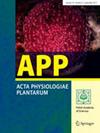Exogenous application of melatonin and jasmonic acid protects the sugar beet from heat stress by modulating the enzymatic antioxidants deference mechanism and accumulation of organic osmolytes
Abstract
Heat stress reduces the growth and productivity of agronomic crops and considered as main hazard for sustainable farming. Melatonin and jasmonic acid play an essential role in mitigating the adversities of abiotic stresses. Therefore; current experiment was performed to assess the potential of sole and collective application of melatonin and jasmonic acid to mitigate the adversities of high temperature on sugar beet. Experimental treatments consisted of control (Ck), water spray, melatonin (150 µM), jasmonic acid (150 µM) and melatonin (150 µM) + jasmonic acid (150 µM) applied on sugar beet plants grown under two temperature levels; normal condition and heat stress (inside sheet). Results indicated that high temperature remarkably decreased leaf chlorophyll pigments, and relative water contents while increased electrolyte leakage, hydrogen peroxide, thiobarbituric acid reactive substances (TBARS), activities of antioxidant enzymes, and concentration of organic osmolytes in sugar beet leaves. However; separate and collective application of melatonin and jasmonic acid alleviate negative impact of high temperature by improving photosynthetic pigments, gas exchange attributes and concentration of osmolytes in the leaves of sugar beet. Application of melatonin + jasmonic acid enhanced the activities of antioxidants which reduced the harmful impact of ROS. Moreover; foliar application of melatonin + jasmonic acid considerably increased the root yield and yield attributes and sugar recovery in heat stress condition. It was concluded that combined application of melatonin + jasmonic alleviate the adversities of heat stress by enhancing the leaves chlorophyll contents, gas exchange attributes, osmo-protectants, activities of enzymatic antioxidants. Finding of the study revealed that collective applied melatonin + jasmonic acid found to be useful techniques for cultivation of sugar beet at high temperature stress.

 求助内容:
求助内容: 应助结果提醒方式:
应助结果提醒方式:


